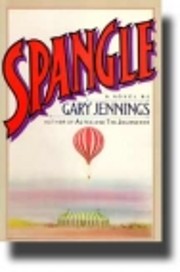

Click on a thumbnail to go to Google Books.
|
Loading... Spangle (1987)by Gary Jennings

No current Talk conversations about this book. no reviews | add a review
Belongs to SeriesSpangle (1-3)
Tells the adventures of a nineteenthcentury circus troupe as it travels from the post-Civil War South to the capitals and courts of Europe. No library descriptions found. |
Current DiscussionsNonePopular covers
 Google Books — Loading... Google Books — Loading...GenresMelvil Decimal System (DDC)813.54Literature American literature in English American fiction in English 1900-1999 1945-1999LC ClassificationRatingAverage: (4.03) (4.03)
Is this you?Become a LibraryThing Author. |
||||||||||||||||||||||||||||||||||||||||||||||||||||||||||||||||||||||||||||||||||||||||||||||||||||||||||||||||||||||||
Its subject matter didn't grab me when I read all of his other major novels some twenty years ago, and it was a job to find a copy of it now. It begins with the conclusion of the American Civil War in 1865 and it's an easy novel to get into, aside from how everyone seems to be an etymologist. There's enough fascinating circus information and colourful characters to keep the story going until the plot emerges: Florian aims to raise his circus to preeminence among the greats, eventually to play in Paris and win the acclaim of the circus' most discerning audience. Along the way I fully anticipated the usual non-PC weirdness that Jennings is known for, and predictably all of the trigger warnings you can think of apply. Clover Lee is the novel's first sore point, a girl of 13 or 14 years with the sexual confidence of someone twice her age. The Chinese acrobats are literally treated as less than human, although there's eventually some comeuppance. These and other instances could be dismissed as versimilitude, although I do think there's pretty clear evidence that Jennings believed homosexuality is a choice.
Jennings compensates for his peccadillos with a stellar ability to recreate time and place. He travelled with several circuses to make this novel happen, and I expect he must have visited every location described in the United States and across Europe. The story highlights several landmarks that I wasn't familiar with such as St. Patrick's Well, the chain bridge of Budapest, and a number of different palaces. One of the characters has a line that I'm sure is Jennings' own: the desire to learn everything possible about a place he visits, with especially an eye for the little-known. For the historical elements he had to be well versed in the American Civil War, slavery, steamships, the unification of Italy, the Austro-Hungarian Empire, contemporary military arms, etc. Circus details are very much of their period, from the setting up and taking down of a circus tent to training the animals, to the seemingly endless number of ways a circus company can be improved and expanded upon and the variety of acts it can feature (or could at the time). This book also had me looking up period songs, recordings from calliopes, and details about historical figures like Ella Zoyara (whom even Wikipedia has never heard of) and Elisabeth Amalie Eugenie.
I've been away from Jennings for a couple of decades and frankly I've missed him, so nostalgia had a role here. But if you are an established Jennings fan who generally knows what to expect, this is worth the tracking down (beginners should start with "Aztec", and judge if YMMV). I enjoyed this very much as a light summer read, noted flaws and all, and it makes a fine ode. I could imagine the author as a child during the Depression who found reprieve from life's humdrum at the circus, investing him with a wonder that never left him. A dearth of contenders makes it faint praise, but this may be the best novel on the topic - or at least the most informative - that you're ever likely to read, supposing that you can find it. (